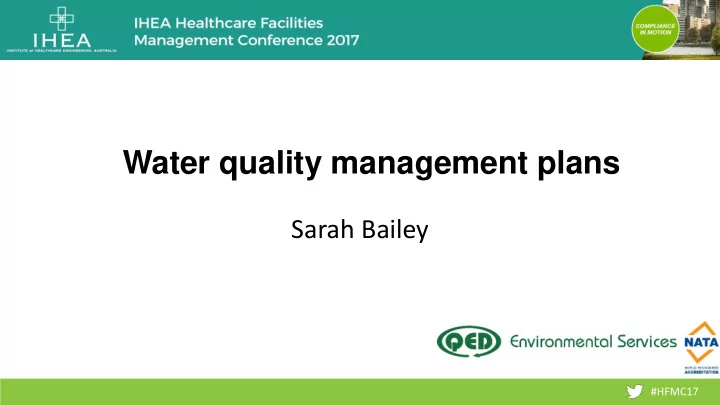

Water quality management plans Sarah Bailey #HFMC17
#HFMC17
#HFMC17
#HFMC17
#HFMC17
#HFMC17
#HFMC17
#HFMC17
http://www.qed.com.au/sites/default/files/ 39_104_Legionella_Risk_Management_Whitepaper.pdf #HFMC17
En health • En health guidelines released in 2015 • Guidelines sit over the top of each States’ regulatory framework. • Applies to all water systems except Cooling Towers • Provide a template Risk Management plan online #HFMC17
En Health Concentrate on proactively managing risk, rather than reacting to positive testing results – System analysis – Construction Materials – Components – Temperature – Other connected systems – Previous testing – Outlets #HFMC17
What is Legionella? Why is it important? – Outbreaks – Hard to trace – Hard to diagnose – High mortality rate – High rate of ICU admission #HFMC17
Risk factors • Middle to Advanced age • Male • Smoking • Chronic heart or lung disease • Immunocompromised hosts / Diabetes • Hematologic malignancies • End-stage renal disease • Alcohol abuse #HFMC17
Sources • Cooling systems • Warm water systems • Showers • Decorative fountains • Humidifiers • Respiratory therapy equipment • Whirlpool spas • Ice machines • Potting soil • Compost • Roadside puddles • Commercial car wash systems https://i.ytimg.com/vi/k6MsxVs9exg/maxresdefault.jpg http://www.airsolutionz.co.nz/wp-content/uploads/2013/10/cooling-towers.jpg http://homeprosontheweb.com/wp-content/uploads/2013/11/hard-water-shower-head.jpg #HFMC17
Risks for Legionella proliferation • Temperatures of 20-42°C • Stagnation • Nutrient growth • Poor water quality • Scale and sediment • Presence of other organisms #HFMC17
NSW Code of Practice for the Control of Legionnaires’ Disease 2004 #HFMC17
Other microorganisms of concern • Stenotrophomonas maltophila • Serratia marcescens • Enterobacter spp. • Cryptosporidium • Non tuberculosis Mycobacteria (NTM) • Mycobacterium chimera #HFMC17
Pseudomonas aeruginosa • • Respiratory disease Water borne • • Skin infections Tap fittings • Mops and cloths • • Burns infections Flowers • Resistant to antibiotics #HFMC17
Developing a risk management plan • Water quality • Supply • Emergency planning - supply • Uses of water • The distribution system • Design • Monitoring • Emergency planning - detections #HFMC17
Water quality • Potable water quality – know your source • Above drinking water standards – Assess the risk of the patients who are supplied • Oncology (Chemotherapy) • Newborns • Older people • Immunosuppressed patients • Respiratory patients. #HFMC17
Emergency Planning • What will you do if you have no supply? • Is your alternative water source safe for all uses? • How are you going to transition back to mains water? #HFMC17
System knowledge Know your system – Schematics – Outlets – Bores – TMVs – Strainers – Pipework materials – New fittings #HFMC17
Design Take water quality into account at the design process – Warm and hot water systems – Don’t fill the building with water too soon – Selection of fittings – Where the services go #HFMC17
Uses of water • • Showering Heater coolers • • Drinking Humidifiers • • Food preparation Misters • • Ice machines Cooling • • Water features Heating • Disinfection equipment • Condensed steam • RO water #HFMC17
Ownership and training • Management training • Infection control training • Cleaning staff training • Plumbing staff and contractor training. – Ownership of the wards and hospital – Reporting mechanism for problems #HFMC17
Monitoring Operational monitoring – Ensures that the controls are effective • Eg, residual chlorine, temperature, pH, turbidity Verification monitoring – To detect general colonisation – To determine effectiveness of control strategy • Legionella testing • Other microbial testing #HFMC17
Emergency management - Detections • Know who needs to be notified • Have a plan in place – Media liaison – Medical advice – Infection Control #HFMC17
Exposure controls • Removal of aerators from taps • No mist generating devices • Low aerosol producing showers • Microfiltration to remove bacteria from water • Aerosol management • Avoiding water chillers and ice machines #HFMC17
Overview • Whole of facility should be involved • Know your water distribution system • Know your supply • Testing is only part of the plan • Compliance doesn’t mean everything is OK • Living document #HFMC17
Recommend
More recommend